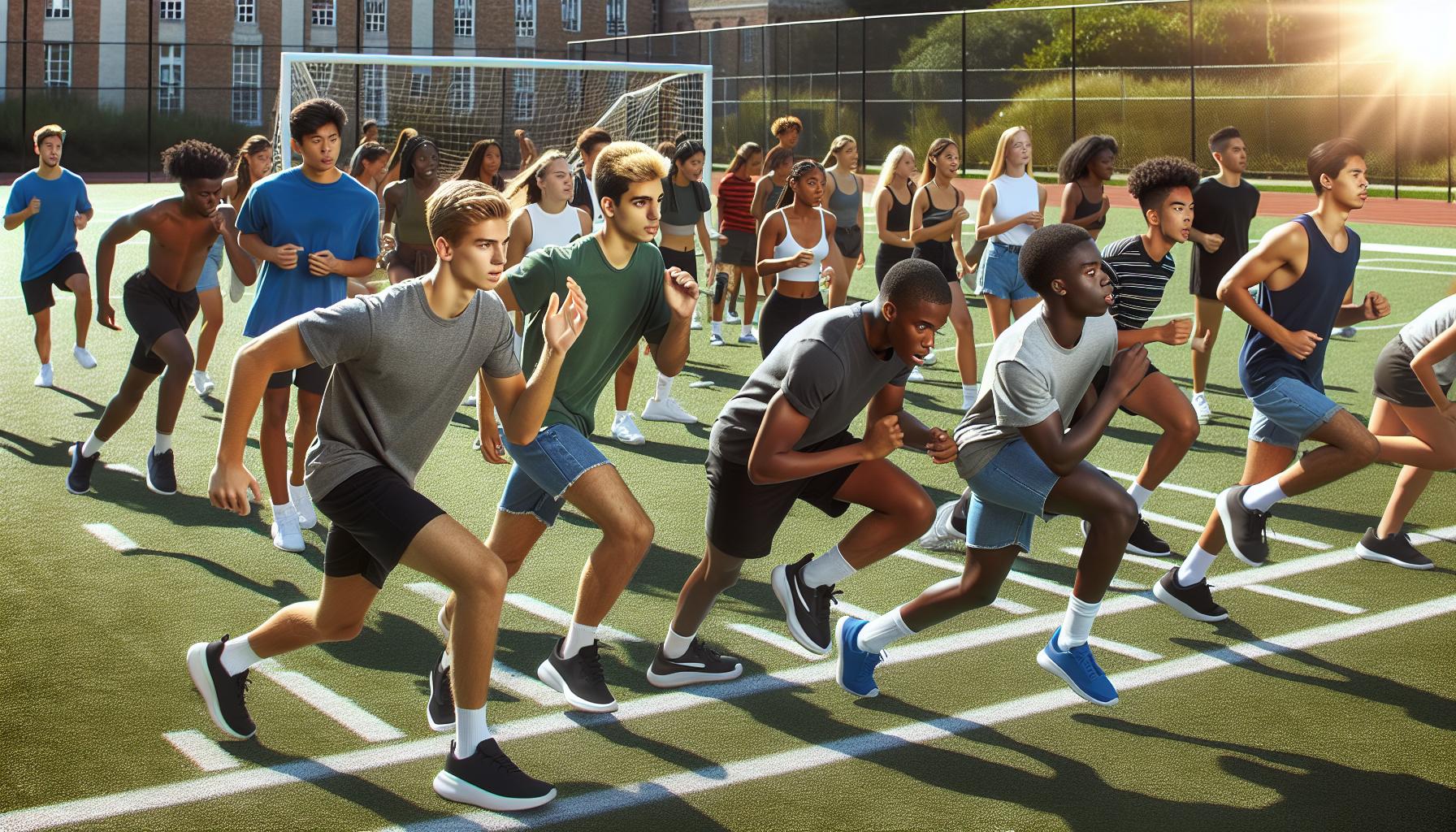
As a health and physical education professional, I’ve seen firsthand how a degree in this field can open doors to countless rewarding career opportunities. Whether you’re passionate about promoting wellness or inspiring others to lead healthier lives, pursuing this dynamic degree combines the best of both worlds.
I’m often asked about the value of a health and physical education degree, and I can confidently say it’s more relevant than ever. With rising concerns about public health and increasing demand for qualified professionals, graduates are uniquely positioned to tackle modern health challenges. From teaching in schools to designing corporate wellness programs, this versatile degree equips you with essential knowledge in anatomy, nutrition, exercise science, and educational methods.
- A health and physical education degree combines exercise science, teaching methods, and wellness promotion, preparing graduates for diverse career opportunities in education and health sectors.
- Graduates can pursue various career paths including PE teachers ($62,870/year), athletic directors ($76,940/year), strength specialists ($47,230/year), and personal trainers ($45,850/year).
- The curriculum requires 120-130 credit hours covering biology, health science, physical education, and teaching methods, plus practical components like student teaching internships.
- Professional certifications are crucial, including state teaching certification, National Board Certification, and specialized credentials in coaching, fitness, and health education.
- Physical education professionals must maintain advanced fitness levels and demonstrate teaching competencies, including classroom management and adaptable instruction methods.
- Additional career advancement opportunities exist through graduate studies, with options for M.S., M.A.T., or M.Ed. degrees focusing on specialized areas of health and physical education.
Health and Physical Education Degree?
A health and physical education degree combines comprehensive knowledge of human movement science with educational principles. This specialized program prepares graduates to teach physical education promote wellness across diverse populations.
Core Curriculum Components
The core curriculum integrates essential courses that build a strong foundation in:
- Exercise Physiology – Study of body responses during physical activity
- Biomechanics – Analysis of movement patterns body mechanics
- Anatomy – Detailed examination of musculoskeletal systems
- Nutrition Science – Understanding dietary needs across life stages
- Teaching Methods – Development of instructional strategies assessment techniques
- Health Psychology – Exploration of behavioral aspects in health education
- First Aid CPR – Emergency response certification training
| Course Category | Credit Hours | Practical Hours |
|---|---|---|
| Science Core | 30 | 120 |
| Education Core | 24 | 100 |
| Clinical Work | 16 | 200 |
Specialization Options
The degree offers focused tracks aligned with specific career paths:
- K-12 Physical Education
- Teaching certification requirements
- Child development principles
- Adaptive physical education methods
- Sports Coaching
- Team management strategies
- Performance assessment techniques
- Athletic training fundamentals
- Community Health Education
- Public health program development
- Health promotion strategies
- Wellness program coordination
- Corporate Wellness
- Workplace health initiatives
- Employee fitness programs
Career Opportunities After Graduation
A health and physical education degree opens diverse career paths across education, athletics, wellness promotion, and community health sectors. The comprehensive curriculum equips graduates with specialized skills for multiple professional roles.
Teaching Positions
Physical education teaching positions exist at elementary, middle, and high school levels in both public and private institutions. Certified PE teachers earn an average salary of $62,870 per year while implementing fitness programs, conducting health assessments, and organizing sports activities. Additional opportunities include:
- Adaptive physical education specialist working with students who have disabilities
- Health education instructor developing curriculum for nutrition and wellness courses
- Elementary movement specialist focusing on motor skill development
- School wellness coordinator managing district-wide health initiatives
- Driver education instructor combining health and safety principles
Coaching and Athletic Roles
The sports and athletics sector offers positions combining physical education expertise with leadership skills. Common roles include:
- School athletic director managing sports programs ($76,940 average salary)
- Team coach for specific sports at scholastic or collegiate levels
- Sports camp director organizing youth athletic programs
- Strength and conditioning specialist training athletes ($47,230 average salary)
- Recreation program coordinator planning community sports activities
- Personal trainer working with individual clients ($45,850 average salary)
| Position | Average Annual Salary |
|---|---|
| PE Teacher | $62,870 |
| Athletic Director | $76,940 |
| Strength Specialist | $47,230 |
| Personal Trainer | $45,850 |
Essential Skills and Competencies
A health and physical education degree demands specific abilities that blend physical prowess with educational expertise. These competencies form the foundation for successful career advancement in educational settings sports organizations.
Physical Fitness Requirements
Physical education professionals maintain advanced levels of physical fitness to demonstrate exercises effectively. I maintain cardiorespiratory endurance through activities like:
- Running 1.5 miles in under 12 minutes
- Swimming 500 meters continuously
- Performing 40 push-ups in one minute
- Holding plank position for 2 minutes
- Demonstrating proper form in Olympic lifts
My muscular strength meets specific benchmarks:
| Fitness Component | Required Standard |
|---|---|
| Bench Press | 1x body weight |
| Squat | 1.5x body weight |
| Deadlift | 2x body weight |
| Pull-ups | 10 consecutive reps |
Teaching and Leadership Abilities
I demonstrate essential instructional competencies through:
- Creating detailed lesson plans aligned with state standards
- Delivering clear verbal instructions for complex movements
- Adapting teaching methods for diverse learning styles
- Managing groups of 25-30 students effectively
- Implementing behavior management strategies
My leadership capabilities include:
- Organizing intramural sports programs for 100+ participants
- Coordinating with administrative staff on curriculum development
- Leading professional development workshops
- Conducting safety protocols during emergencies
- Mentoring new teaching assistants in classroom management
These combined abilities enable successful instruction delivery while maintaining professional standards in educational settings.
Education Requirements and Coursework
A health and physical education degree requires specific academic prerequisites and a structured curriculum path. The educational journey combines theoretical knowledge with practical experience to create competent health and physical education professionals.
Bachelor’s Degree Components
A bachelor’s degree in health and physical education includes 120-130 credit hours of coursework spread across 4 years. The core curriculum encompasses:
- Biology courses: Anatomy, physiology, kinesiology
- Health science courses: Nutrition, personal health, community health
- Physical education courses: Sports skills, exercise science, motor development
- Education courses: Teaching methods, classroom management, curriculum development
- Practical components: Student teaching internship (12-16 weeks), field observations (100+ hours)
- General education requirements: Mathematics, English composition, social sciences
Graduate Study Options
Master’s degree programs in health and physical education offer specialized tracks:
- Master of Science in Physical Education (M.S.): 30-36 credits focusing on advanced teaching methods, research methodology, sport psychology
- Master of Arts in Teaching (M.A.T.): 36-45 credits emphasizing pedagogical theory, curriculum design, assessment strategies
- Master of Education (M.Ed.): 30-36 credits concentrating on educational leadership, program development, advanced instructional techniques
Additional certification options include:
- National Board Certification in Physical Education
- State-specific teaching endorsements
- Specialized certificates in:
- Adapted Physical Education
- Sport Coaching
- Health Education
- Exercise Science
- Bachelor’s degree from an accredited institution
- Minimum GPA of 3.0
- GRE scores (program-specific requirements)
- Teaching license (for some programs)
- Letters of recommendation
- Statement of purpose
Professional Certifications and Licensing
Health and physical education professionals obtain specific certifications and licenses to validate their expertise and meet employment requirements. These credentials demonstrate competency and enhance career opportunities in various educational settings.
State Teaching Certification
State teaching certification requirements vary by location but typically include:
- Complete an accredited teacher preparation program
- Pass state-specific content knowledge tests (Praxis II Physical Education exam)
- Submit fingerprints for background clearance checks
- Earn CPR and First Aid certification
- Complete supervised student teaching (400-600 hours)
- Submit official transcripts showing bachelor’s degree completion
- Pay licensing fees ($50-$200)
Teaching licenses require renewal every 3-5 years through:
- Professional development hours (75-150 hours)
- Continuing education credits
- Teaching performance evaluations
- Updated background checks
- National Board Certification in Physical Education
- Valid for 5 years
- Requires 3+ years teaching experience
- Involves portfolio submission
- Costs $1,900 for initial certification
- Sport-Specific Certifications
- National High School Coaching Certification
- USA Track & Field Level 1 Coach
- American Swimming Coaches Association certification
- National Soccer Coaches Association of America licenses
- Fitness Industry Credentials
- ACSM Certified Exercise Physiologist
- NSCA Certified Strength & Conditioning Specialist
- ACE Health Coach Certification
- NASM Performance Enhancement Specialist
- Health Education Specialist Certification
- CHES (Certified Health Education Specialist)
- MCHES (Master Certified Health Education Specialist)
- Valid for 5 years
- Requires 75 continuing education credits for renewal
A health and physical education degree opens doors to rewarding careers that make a real difference in people’s lives. I’ve shown how this versatile degree equips graduates with essential knowledge and skills for success in teaching physical education promoting wellness and leading athletic programs.
Whether you’re passionate about teaching shaping young minds or developing community health programs this field offers numerous opportunities for growth. With competitive salaries strong job prospects and the personal satisfaction of improving others’ lives I believe it’s an excellent choice for those dedicated to health and education.
The combination of practical experience theoretical knowledge and professional certifications creates a solid foundation for a meaningful career in this dynamic field. I’m confident that pursuing this degree is a smart investment in your future.










